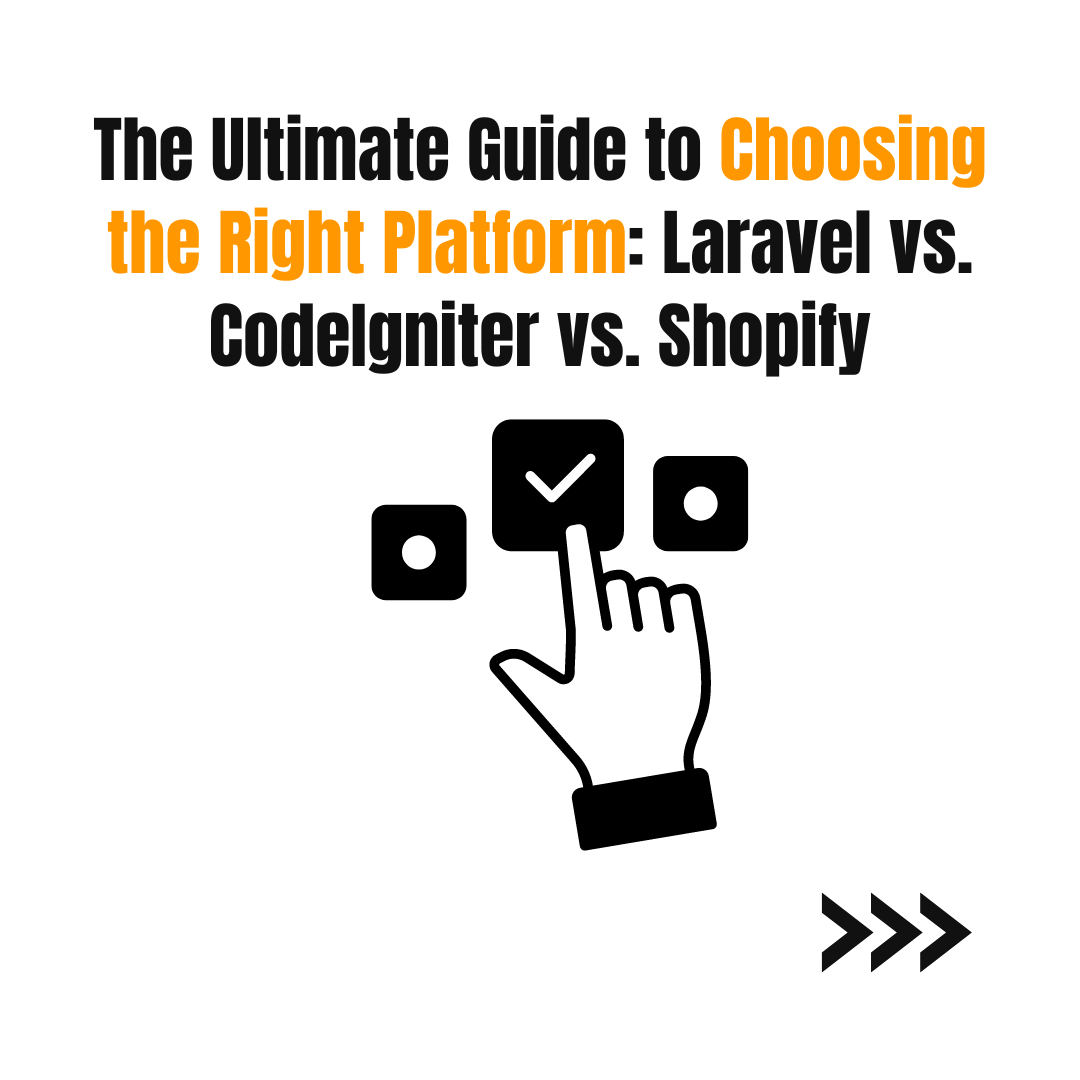Choosing the right platform for your website is a crucial decision that can impact your business's online success. With numerous options available, it can be challenging to determine which platform best suits your needs. In this guide, we will compare three popular web development platforms—Laravel, CodeIgniter, and Shopify—to help you make an informed decision. We’ll explore their features, benefits, and use cases to ensure you choose the right solution for your project.
1. Introduction to the Platforms
Laravel: Laravel is a PHP framework known for its elegant syntax and powerful features. It is designed for web artisans who need a simple and enjoyable toolkit to create full-featured web applications. Laravel excels in handling complex functionalities and offers robust security, scalability, and performance.
CodeIgniter: CodeIgniter is another PHP framework that is lightweight and straightforward to use. It is ideal for developers looking for a minimalistic and high-performance framework. CodeIgniter’s small footprint makes it easy to deploy and manage, particularly for smaller projects or those requiring less complexity.
Shopify: Shopify is a leading e-commerce platform that allows businesses to set up and manage online stores with ease. It is a fully hosted solution, providing everything from storefront design to payment processing. Shopify is renowned for its user-friendly interface and extensive app ecosystem, making it perfect for e-commerce sites.
2. Ease of Use
Laravel: Laravel has a steeper learning curve due to its comprehensive set of features and functionalities. However, it provides extensive documentation and a supportive community, which can help ease the learning process for developers.
CodeIgniter: CodeIgniter is known for its simplicity and ease of use. It requires minimal configuration and has a straightforward setup process, making it an excellent choice for beginners or projects with tight deadlines.
Shopify: Shopify is designed with non-technical users in mind. Its intuitive drag-and-drop interface allows business owners to set up and manage their stores without needing extensive technical knowledge. Shopify’s ease of use is one of its strongest selling points.
3. Customization and Flexibility
Laravel: Laravel offers unparalleled customization and flexibility. Developers can build highly customized web applications tailored to specific business needs. Its modular architecture allows for the integration of third-party packages and libraries, enhancing functionality.
CodeIgniter: While CodeIgniter is less feature-rich than Laravel, it still offers a decent level of customization. Developers can extend the core system with plugins and libraries, although it may require more manual coding compared to Laravel.
Shopify: Shopify provides a range of customization options through its themes and apps. However, it is less flexible than Laravel and CodeIgniter when it comes to building custom functionalities. Shopify’s customization is primarily geared towards e-commerce needs.
4. Scalability
Laravel: Laravel is highly scalable, making it suitable for large and complex web applications. Its built-in tools for caching, database management, and queueing allow for efficient handling of high traffic and data loads.
CodeIgniter: CodeIgniter is suitable for small to medium-sized projects. While it can handle moderate traffic, it may not be the best choice for highly scalable applications due to its limited built-in scalability features.
Shopify: Shopify is designed to scale with your business. Its cloud-based infrastructure can handle large volumes of traffic and transactions, making it a reliable choice for growing e-commerce businesses.
5. Security
Laravel: Laravel prioritizes security, providing built-in protection against common vulnerabilities such as SQL injection, cross-site scripting (XSS), and cross-site request forgery (CSRF). It also offers features like hashed passwords and user authentication out of the box.
CodeIgniter: CodeIgniter offers basic security features, including XSS filtering and CSRF protection. However, it may require additional configurations and coding to achieve the same level of security as Laravel.
Shopify: Shopify takes security seriously, offering SSL encryption, PCI compliance, and regular security updates. As a hosted platform, Shopify handles most of the security aspects, allowing merchants to focus on their business.
6. Cost
Laravel: Laravel itself is an open-source framework, so there are no licensing fees. However, the cost of development can vary based on the complexity of the project and the rates of the developers.
CodeIgniter: CodeIgniter is also open-source, with no licensing costs. Development costs are generally lower compared to Laravel, making it a cost-effective option for smaller projects.
Shopify: Shopify operates on a subscription model, with different pricing tiers based on the features and scale of the store. While it may involve higher ongoing costs compared to self-hosted solutions, the convenience and support it offers can justify the expense.
7. Support and Community
Laravel: Laravel has a large and active community, providing extensive resources, tutorials, and forums for support. Its community-driven ecosystem ensures continuous improvement and a wealth of knowledge for developers.
CodeIgniter: CodeIgniter also has a supportive community, though it is smaller than Laravel’s. It offers comprehensive documentation and a range of community resources.
Shopify: Shopify provides 24/7 customer support, extensive documentation, and a vibrant community of developers and merchants. Its support infrastructure is one of its strong points, ensuring users can get help when needed.
Conclusion
Choosing the right platform for your website depends on your specific needs, technical expertise, and budget. Laravel is an excellent choice for complex and scalable applications requiring extensive customization. CodeIgniter offers a simpler, more lightweight solution suitable for smaller projects. Shopify stands out as the go-to platform for e-commerce businesses, providing ease of use and robust features tailored to online retail.
